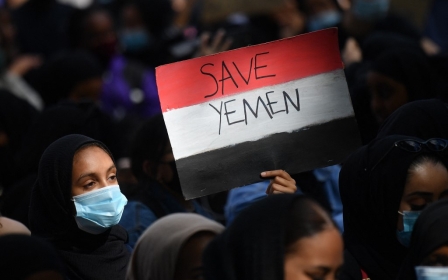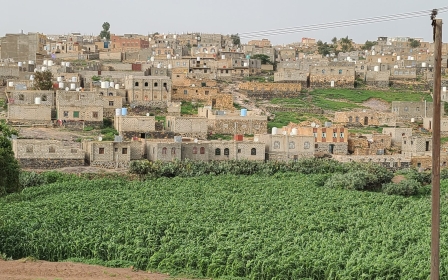Hundreds of Yemeni professionals in Saudi Arabia laid off and told to go home

In 2012, Mohammed was struggling to find a job at a Yemeni university. The English professor had worked for years as a private tutor, but finding a full-time academic job was proving impossible.
So, he decided to leave for Saudi Arabia in search of his perfect job.
“I was lucky to find a job at a Saudi university and that was my dream,” Mohammed told Middle East Eye (MEE). “Hundreds of Yemeni professors have enjoyed a good life and managed to provide for our families and other relatives in Yemen.”
But without warning or explanation, that dream has been cut short.
In July and August, universities in the southern Saudi provinces of Baha, Jizan, Najran, and Asir began terminating the contracts of all Yemeni academics. According to Mohammed, other foreign staff have not been affected.
New MEE newsletter: Jerusalem Dispatch
Sign up to get the latest insights and analysis on Israel-Palestine, alongside Turkey Unpacked and other MEE newsletters
“We have been informed by the university that our contracts have been terminated and we have only four months’ notice to leave Saudi Arabia,” Mohammed said. “This happened suddenly and we don’t know what the reason behind this decision is.”
It is believed hundreds of Yemenis in southern Saudi Arabia have been affected. Not only academics but teachers and doctors have been made redundant and told they must return home, according to local media.
In Najran alone, 106 established university staff have been laid off.
Mohammed, who - like the other Yemenis in Saudi Arabia spoken to for this story - has had his name changed for security reasons, has never thought about returning to Yemen until now.
Life for academics in the war-torn country has become ever more difficult, particularly as Yemen’s economy has nosedived in recent years. Inflation and cash reserves have been hit by the conflict there, the Saudi blockade, and competing fiscal policies by the rival Sanaa- and Aden-based administrations, among other crises.
“Professors in Yemen haven’t received salaries since 2016, so there was no way to think about coming back to Yemen and I planned to stay in Saudi Arabia until the war ends and Yemen becomes better,” Mohammed said, adding that he expects to go back home in a couple of months.
“I think our replacements will be from other nationalities, and not Saudis, but either way we will go back to Yemen soon and start to think about where we can move to next because Yemen is difficult.”
Hostile environment
There are about two million Yemeni expatriates working in Saudi Arabia. Thousands of those are highly qualified and have been working in education, medicine, and other professions across the kingdom.
Yet life has become increasingly difficult for them. The Saudi government has sought to hire more of its own citizens to the workforce, with Yemenis complaining in recent years that they have had to make way for Saudis.
Occasional mass expulsions have been witnessed in recent years, yet for the most part, the victims have been low-skilled or undocumented workers, rather than middle-class professionals.
'We have been informed by the university that our contracts have been terminated and we have only four months’ notice to leave Saudi Arabia'
- Mohammed, academic
Meanwhile, Riyadh has raised fees charged for Yemenis’ dependents, making it prohibitively expensive to live in Saudi Arabia for some.
This current wave of redundancies appears to only affect educated professionals.
Ali, a Yemeni supermarket worker in Najran, told MEE that neither he nor any of his colleagues have been caught up in the sweep.
“I heard that only professors and doctors were asked to leave the southern provinces of Saudi Arabia but for us and other workers, we are working normally,” he said.
Ali, who has been working in Saudi Arabia since 2013, said tens of thousands of Yemenis work in all kinds of jobs in Najran, and it would be “a disaster” if they were asked to leave Saudi Arabia.
“I heard many rumors about those professors, but I think this is something related to the Ministry of Higher Education and not a decision to all workers and hope such a decision won’t involve us in future.”
The Saudi authorities haven’t commented on this decision and it is still not clear what the reason behind the decision is.
Middle East Eye has asked the Saudi embassy in London for comment.
Difficult return
Marwan Mohammed, who returned home last year because of the expensive fees Yemeni expats began being charged, believes Yemenis in southern Saudi Arabia, in general, are safe, and this seems to be an issue with certain professions.
“The Saudi authorities terminated the contracts of hundreds of academics, and that’s a very small number in comparison to all Yemeni expats in Saudi,” he told MEE.
Some speculate that the authorities are trying to stem the remittances that flow down to Yemen. But in truth, Mohammed said, those are negligent for the Saudi government.
“I think the decision was taken by the Ministry of Higher Education for their own reasons,” he said, adding that finding work again in Yemen will be very difficult for the redundant academics.
“For me, it was difficult to return to Yemen and I’m still looking for any job. I think the academics will face similar difficulty in Yemen, but they have no option,” he said.
Yemenis have always headed to Saudi Arabia for employment opportunities, and the neighbours’ relationship has only deepened since Riyadh intervened in Yemen’s war in 2015.
With Saudi Arabia and its allies imposing a blockade on Yemen and contributing to its crisis through warfare against the Houthi movement, many Yemenis believe Riyadh should give them all the help they can, rather than seek their removal.
Some 80 percent of Yemen’s 30 million population is reliant on some sort of aid. The United Nations has called Yemen the world’s worst humanitarian crisis.
“Saudi Arabia should receive more displaced Yemenis because Yemen is witnessing war and it is a neighboring country. But we see it is forcing Yemenis to return to live under war,” Abubaker al-Raboie, a displaced man in southern Yemen’s Taiz, told MEE.
“What we know is that neighboring countries of conflict countries open borders for displaced people to flee to safe areas, and Saudi is doing the opposite.”
Raboie himself has been trying to flee to Saudi Arabia with the help of smugglers, but it is very dangerous and for now, he has given up and remained in Taiz.
“Before the war, I didn’t think of leaving Yemen as I was working well and in a safe environment. But after that we started to think about leaving Yemen,” he said.
“Saudi Arabia has the right to expel Yemenis, but this isn’t the right time as it is leading a war in our country and hasn’t helped us to have a good life.”
Middle East Eye delivers independent and unrivalled coverage and analysis of the Middle East, North Africa and beyond. To learn more about republishing this content and the associated fees, please fill out this form. More about MEE can be found here.





